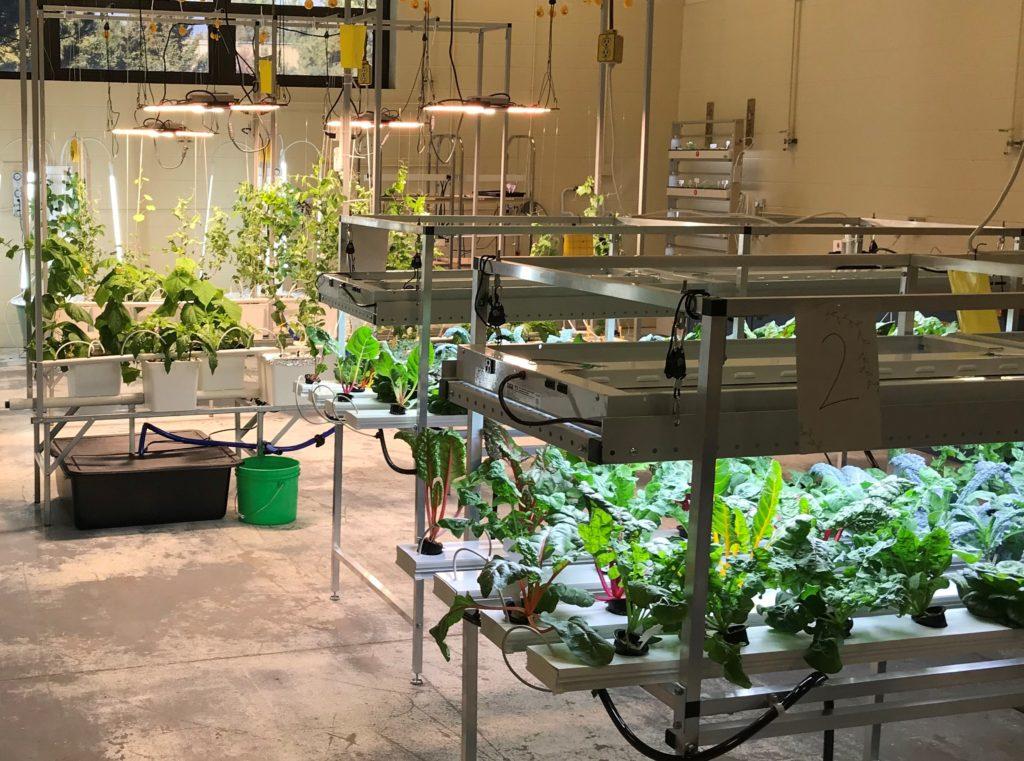Kicking off the 2020 school year, NMU now offers an indoor agriculture program that allows students to have a hands-on learning experience of indoor agriculture, as well as pursuing an associate’s degree in the field.
For the fall semester of 2020, NMU launched a two year indoor agriculture associate degree program in applied science degree and is working towards a four year bachelor’s degree program. Registration for the upcoming winter 2021 courses are already closing in on the cap of 72 student seat capacity, showing a growing interest in the program.
According to NMU’s Technology and Occupational Sciences web page, the indoor agriculture associate degree is a collaborative and hands-on approach to feature multiple departments and academic programs to create the first known higher education interdisciplinary indoor agriculture program.
“The program will provide students with hands-on, exploration-based learning of indoor agriculture, associated growing and environmental infrastructure systems,” according to the program’s website.
In this program, students will learn about different growing systems like hydroponics, aquaponics and aeroponics, indoor growing space design and construction, climate-control systems and more which can be found on the current course listing linked above.
Department head Dr. John Centko said through an email that with the population growth, climate concerns, irregular growing seasons and issues such as COVID-19, these challenges provide a need for more efficient and local food production.
“We feel the timing is right because enhanced awareness around food shortages, water conservation and sustainability issues pertaining to food production and processes,” Centko said.
This program will give students the chance to learn hands-on the importance of indoor agriculture and the benefits of implementing more sustainability practices in food production such as indoor urban farming.
“Growing climate and population concerns underscore the need for efficient and sustainable farming practices to help reduce depletion of resources,” according to the program’s website. “Adaptation of indoor, urban farming models to northern climates in multiple structure and building types in order to provide fresh, local food sourcing year-round highlights this program’s push for sustainability,”
Centko also went into detail about the importance of the program where students have a chance to learn the benefits of agriculture, but also learn about entrepreneurialism as well.
“There is a growing need for sustainable, regional and local food sourcing, including farm to table. There are many health and nutritional issues that are eliminated by indoor growing practice,” Centko said. “It will have a positive impact on rural economic development and creation of jobs.”
Kim Smith Kolasa, assistant professor of technology and occupational sciences, was hired to teach the program as well as develop a plan for the program to evolve and grow into a four year bachelor’s degree. Kolasa explained in greater detail the importance of this program and what students can expect from this program.
“Watching students learn and develop an understanding of their ability to control environmental factors like temperature, lighting, air movement and humidity to influence indoor growing is what the indoor agriculture program is all about,” Kolasa said.
According to the indoor agriculture web page, students will have the ability after completing the program to apply indoor agriculture growing techniques to various forms of horticulture, understand background principles of plant chemistry and plant physiology, apply knowledge and understanding of basic mechanical, electrical and plumbing systems to support indoor agriculture requirements and understand food system networks, distribution and associated societal impacts.
“We met with several industry representatives who indicated they would hire every program graduate. They said our curriculum is spot-on and our students will be highly employable with varied skill sets integral and applicable to all indoor growing scenarios,” according to the program’s website.
For anyone who is looking for guidance pertaining to the indoor agriculture program, Evan Lucas, assistant professor of technology and occupational sciences, said that the department is looking forward to the new program and will help anyone interested in applying.
“We have already been contacted by a significant amount of companies from multiple industries across the US, from Hawaii to NYC, and Canada, who have all expressed tremendous interest in the development of this program and in hiring our graduates,” Lucas said. “We’re encouraged from the constant feedback that these new and emerging industries are in dire need of high-quality, cross disciplined-trained workers and we are the first to specifically aim towards producing that workforce.”
If you are looking for any more information about the new indoor agriculture program, contact the Department of Technology and Occupational Sciences at 227-2190 or send an email to [email protected].
“We couldn’t be happier with how the program has hit the ground running,” Lucas said.























